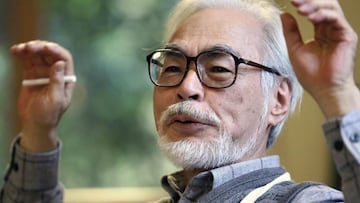What you should ask ChatGPT to create free images based on Hayao Miyazaki’s art—and why maybe you shouldn’t
Though it is easy to ask ChatGPT to create images in the style of Japanese artist Hayao Miyazaki, here’s why you might want to skip this trend.


AI-generated images of beloved Japanese artist and animator Hayao Miyazaki are going viral on social media, and many are wondering how they can create their own.
They are as easy to make as typing “generate Miyazaki-style art” into ChatGPT and waiting for an image to be generated. But before you pop open a new tab, bear with me for a second to explain why maybe you shouldn’t engage in this trend—especially if you are a fan of Miyazaki’s beloved works.
Miyazaki on AI-generated art: “An insult to life itself”
Though many have seen Miyazaki’s films, from Totoro to Spirited Away, and want to replicate his style with their own images, one should consider what the artist himself might think about this possibility. Luckily for us, we have knowledge of Miyazaki’s views on AI-generated art, thanks to the 2016 documentary “Never-Ending Man: Hayao Miyazaki”.
The Independent reported on one incident that took place in 2016, where Miyazaki was captured on camera reacting to AI-generated images. The artist voiced feelings of ‘disgust,’ explaining that “whoever creates this stuff has no idea what pain is whatsoever” and that he saw the images as “an insult to life itself.”
A reminder of Miyazaki’s take on AI: “I would never wish to incorporate this technology into my work at all. … this is an insult to life itself … I feel like we’re nearing the end of times … We humans are losing faith in ourselves.” pic.twitter.com/ubAnVMlio5
— Duncan Reyburn (@duncanreyburn) May 5, 2024
This example gives us a look into how Miyazaki views the artistic process and how AI, though it may appear to reach the same endpoint, neglects the journey completely. For many artists, including Miyazaki, art is a product of struggle, suffering, and the human experience coming to light through one’s talents. Simply typing in a command and receiving a picture is an empty representation of human life that contains none of the emotion that speaks to the viewer.
So before you create your own “Ghibli-style” image in the style of the Japanese animator, take his words into consideration.
Online commentators have also called attention to the individuals and organizations that have been engaging in the viral trend. Miyazaki, an avowed leftist, boycotted the 2003 Academy Awards, where his film Spirited Away won the prize for Best Animated Feature, over his opposition to the US Invasion of Iraq, which had happened a few weeks earlier. Additionally, as a strong supporter of workers, Miyazaki served as the chief secretary of his labor union in the early 1960s, when he was getting his start in the film industry. For individuals like billionaire Elon Musk, who has an openly hostile attitude towards labor, to use AI to generate these images brings to life how the emotion could be sucked out of the style he helped to popularize throughout his career.
Theme of the day pic.twitter.com/2ioG0StAxL
— Elon Musk (@elonmusk) March 26, 2025
The ethical questions raised by AI
As AI becomes more powerful and accessible, the public will be forced to grapple with the ethical questions that arise. These questions will relate to our personal use of technology when attempting to integrate the work of artists, as well as how we expect corporations to use it.
Would it be ethical for a company that owns the rights to a beloved author’s work to ask AI to generate additional stories based on their style? Would it be okay for a music studio to create AI-generated songs based on their ownership of certain master records?
Without proper consideration and regulation, AI could be deployed in ways that exploit or displace workers, eliminating jobs and leaving those affected with no other options. The technology’s advancement must be accompanied by policies that respect workers’ rights and ensure that those who could see their work reduced by AI are not dispossessed or further alienated. Instead, they should be able to claim the benefits of AI rather than have profits distributed solely to corporations who stand to gain from the work of artists and other workers.
Related stories
Get your game on! Whether you’re into NFL touchdowns, NBA buzzer-beaters, world-class soccer goals, or MLB home runs, our app has it all.
Dive into live coverage, expert insights, breaking news, exclusive videos, and more – plus, stay updated on the latest in current affairs and entertainment. Download now for all-access coverage, right at your fingertips – anytime, anywhere.
Complete your personal details to comment